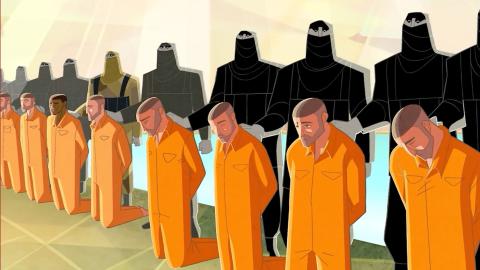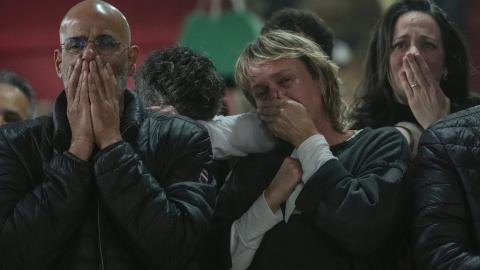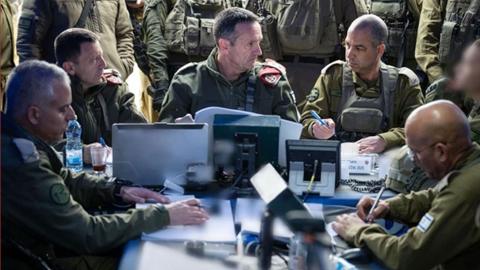As Distance Grows Between Youngest Generation and the Holocaust, AI, New Media Help Them Learn
JERUSALEM, Israel – Recent surveys show that younger generations now removed 80 years from the Holocaust know shockingly little about the murder of six million Jews and others in the death camps before and during World War II.
CBN News spoke with a man who is dedicated to changing that by using Artificial Intelligence, social media, and video games to broaden the understanding of younger generations who didn't learn about "never forget."
The text of the interview with Gideon Taylor, president of the Jewish World Jewish Restitution Organization, and also president of the Claims Conference, is below. Click on the video above to watch our interview.
***Please sign up for CBN Newsletters and download the CBN News app to ensure you keep receiving the latest news.***
JULIE STAHL: Gideon Taylor, welcome to Jerusalem Dateline.
GIDEON TAYLOR: Thank you for having me.
JS: You're the president of the Jewish World Jewish Restitution Organization, as well as the president of the Claims Conference, bringing restitution, bringing compensation, such as it can be for Holocaust survivors. Tell us. you've done a survey recently of eight different countries about their knowledge of the Holocaust, and you found some shocking results. Tell us a little bit about that.
GT: Well, what we're seeing increasingly is that as a generation that's far removed from the time of the Holocaust - (the) younger generation, know shockingly little about the Holocaust. I mean, to give you an example. in the United States today, somewhere around half of all young people could not name one concentration camp. So – meaning the name Auschwitz,– that was so seminal and symbolic for, generations as the incarnation of evil. this is a concern and especially it's coming at a time when there are fewer and fewer Holocaust survivors that can tell their own stories and speak, in their own words, and up to recently, those personal testimonies were so important as part of Holocaust education. In ten years' time, we're not going to have those people and young people are not gonna be able to look a Holocaust survivor in the eye and hear the story of what happened. So this lack of awareness is a tremendous concern to us. we're working to try to combat it by looking at new educational techniques going beyond books and exhibitions, which are critically important, and archives, but to new educational techniques, to new technology. How can we use social media? How can we use AI? Because we need to find ways that we can reach young people in the way they take in information. And, that's why I think this survey is a call to action, for all of us. And you, you did do for the 80th anniversary of the liberation of the Auschwitz concentration camp.
JS: You did do a social media campaign, right? Yes. What kind of response did you have to that?
GT: Tremendous, tremendous response. We find that there is tremendous, huge interest among young people if information is given in a way that they take in. So these were very short snippets of Holocaust survivors talking, (about) aging Holocaust survivors. And people are drawn to it. And we've done other social media campaigns also with very, very short clips of Holocaust survivors. It's a really important way to educate because we need to find these new ways to reach people. And one of the things in the survey that was interesting. despite the bad news of lack of knowledge and awareness, I think perhaps the most important figure was a positive one, which was that when people were asked, "Do you think there should be more Holocaust education?" The answer overwhelming across the eight countries was around 90% said yes.
JS: Wow.
GT: So that gives us hope and encouragement that we may be facing a lack of knowledge and a lack of awareness, but not a lack of interest and a lack of willingness to learn. And I think we need to take this moment, this 80th anniversary, of the liberation of Auschwitz and use it as a moment to say, "ow are we going to make Holocaust education for a world where there won't be Holocaust survivors?"
And finding these techniques through new, new ways of approaching holograms, of Holocaust survivors, new recordings, new films, even games, video games we funded for the first time. Video games (that) took people inside a home on Kristallnacht, when the homes, the Jewish homes were destroyed in Germany. we were looking for ways to connect. And I think that's what we take from this survey.
And that's what we take from this anniversary.
JS: And just real quickly, what do you feel? Do you find that when people hear the truth, that they receive it – that they believe that oh, oh, I was wrong?
GT: I think people. what we find not so much even wrong, but "I didn't know that I wasn't aware." And I think people, yes, they hear it. They take it in. I think the question for us will be, what is the long-term impact of that versus a visit to a museum or a visit to Auschwitz? You know, nothing replaces walking through Auschwitz and to visit a camp. And we think that's why those sites of mass destruction are critical tools for education. Can you do a virtual tour of Auschwitz? Is that good? Yes. It's helpful, it's positive. And I think we need to look at all of them. The answer is we need to do this, and we need to do that. because we need to find different ways that will leave these lessons and will educate a future generation.
So this will not happen again.
JS: Amen. Gideon Taylor, thanks so much for joining us and for your insights in your work.
GT: Thank you. Thank you for having me.




